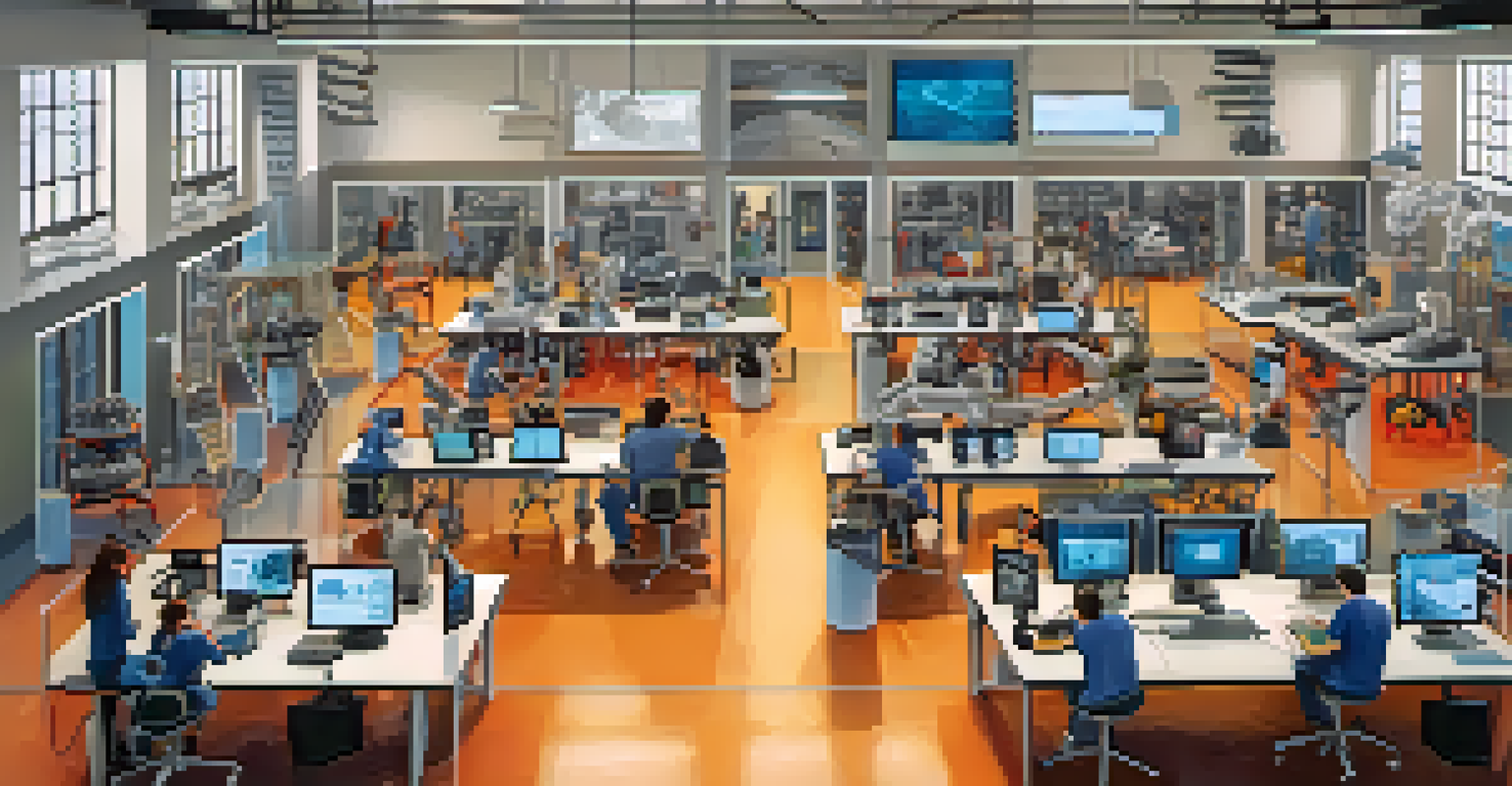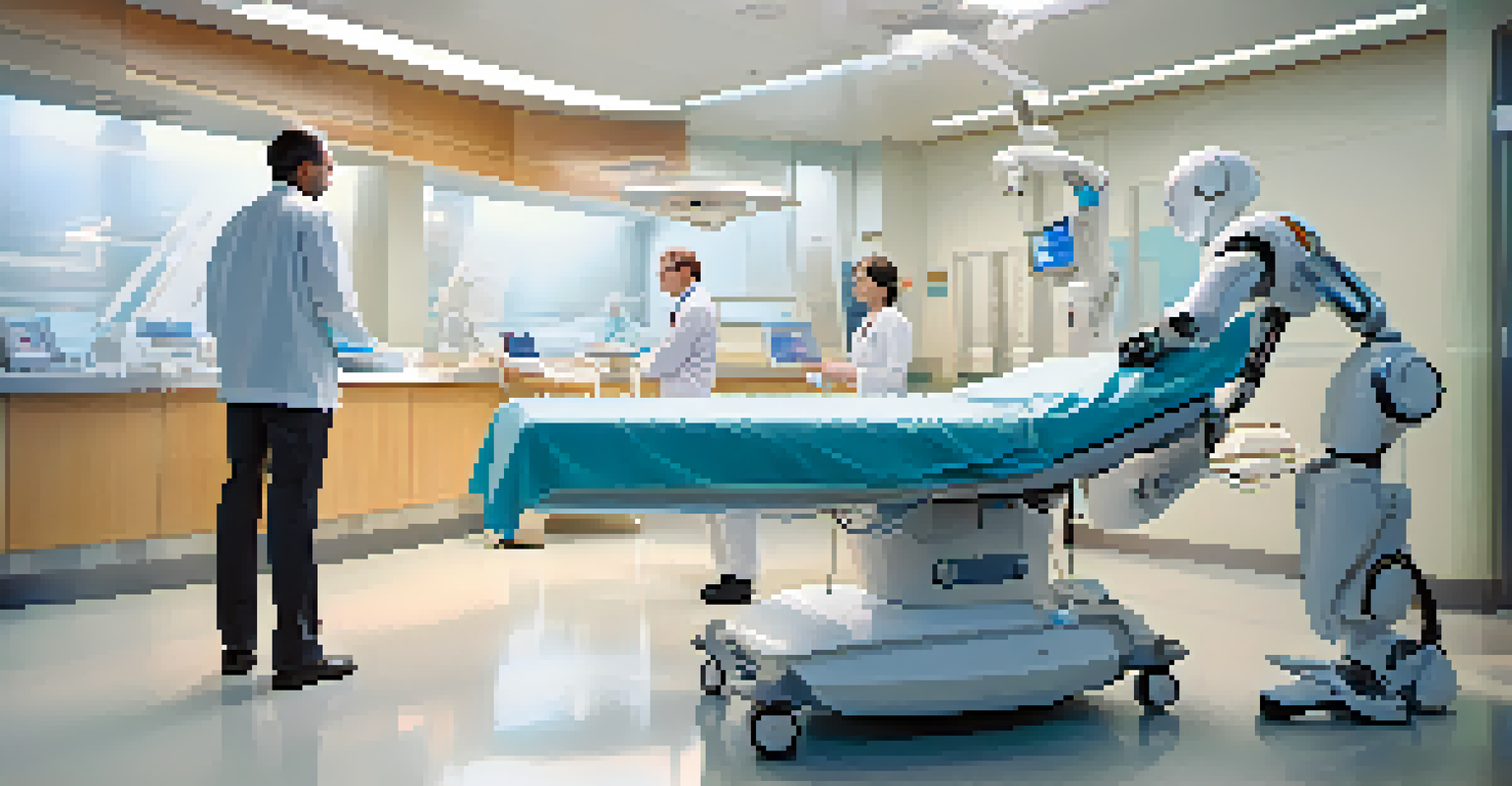Pittsburgh's Robotics Industry: Leading the Future of Tech

A Brief History of Robotics in Pittsburgh
The roots of Pittsburgh's robotics industry can be traced back to the city's rich history in engineering and manufacturing. From the steel mills of the 20th century to the cutting-edge research being conducted today, Pittsburgh has always been a hub for innovation. The establishment of Carnegie Mellon University in 1900 laid the groundwork for a strong educational focus on robotics and artificial intelligence.
The best way to predict the future is to invent it.
As the years progressed, Carnegie Mellon became a leader in robotics research, producing groundbreaking technologies and fostering a culture of collaboration between academia and industry. This synergy has attracted numerous tech companies and startups to the city, creating a vibrant ecosystem for robotics development. The collaborative spirit of Pittsburgh has made it a magnet for talent, drawing in experts from around the globe.
Today, Pittsburgh is often referred to as the 'Robotics Capital of the World,' a title well-earned through decades of investment in research and development. With organizations like the Robotics Institute at Carnegie Mellon leading the charge, the city continues to push the boundaries of what is possible in robotics, setting the stage for future advancements.
Key Players in Pittsburgh's Robotics Scene
Several prominent organizations and companies contribute to Pittsburgh's status as a robotics powerhouse. Carnegie Mellon University stands out as a premier institution, producing some of the brightest minds in the field. Their research ranges from autonomous vehicles to robotic assistants, and their influence can be seen in numerous startups and established companies around the city.

In addition to academia, companies like Uber Advanced Technologies Group and Google’s Robotics division have established research facilities in Pittsburgh. These firms are not only creating innovative technologies but also providing substantial economic opportunities for residents. As a result, Pittsburgh has become a hotbed for tech professionals seeking to work at the forefront of robotics.
Pittsburgh: Robotics Innovation Hub
Pittsburgh's rich history in engineering, coupled with institutions like Carnegie Mellon, has established the city as a leading center for robotics innovation.
Moreover, local startups like RE2 Robotics and Astrobotic are making waves by developing specialized robots for various applications, from healthcare to space exploration. This diverse range of players ensures that Pittsburgh remains a key player in the global robotics landscape, driving forward the future of technology.
The Role of Education and Research Institutions
Education plays a crucial role in sustaining Pittsburgh's robotics industry. Institutions like Carnegie Mellon offer specialized programs and hands-on training that equip students with the skills needed for careers in robotics. These programs emphasize interdisciplinary approaches, combining engineering, computer science, and artificial intelligence to produce well-rounded graduates ready to tackle complex challenges.
Robotics is the science of designing, constructing, and operating robots, and the study of the robot's impact on society.
Research institutions in Pittsburgh are also pivotal in driving innovation. For instance, the Robotics Institute collaborates with industry leaders to develop state-of-the-art technologies that address real-world problems. This partnership between academia and industry not only fuels advancements in robotics but also ensures that students gain practical experience in the field.
Furthermore, initiatives like the Pittsburgh Robotics Network foster collaboration among educational institutions, startups, and established companies. By creating a supportive environment for knowledge sharing and innovation, these institutions contribute significantly to the growth and sustainability of the robotics ecosystem in Pittsburgh.
Innovative Technologies Emerging from Pittsburgh
Pittsburgh is at the forefront of several groundbreaking technologies in robotics. For example, autonomous vehicles have become a major focus, with companies like Argo AI and Aurora working on self-driving technology that promises to revolutionize transportation. These innovations not only aim to enhance safety but also to improve efficiency in urban mobility.
Another exciting area of development is in healthcare robotics. Local firms are creating advanced robotic systems to assist in surgeries and rehabilitation, providing surgeons with enhanced precision and patients with better recovery outcomes. This intersection of robotics and healthcare exemplifies how technology can directly improve quality of life.
Collaborative Ecosystem Drives Growth
The synergy between educational institutions, startups, and established companies fosters a vibrant robotics ecosystem that attracts talent and investment.
Additionally, Pittsburgh's robotics industry is exploring applications in manufacturing and logistics. With the rise of automation, companies are developing robotic systems that can streamline operations and reduce costs. This not only boosts productivity but also positions Pittsburgh as a leader in the future of smart manufacturing.
Challenges Facing the Robotics Industry
Despite its successes, Pittsburgh's robotics industry faces several challenges that could impact its growth. One significant hurdle is the shortage of skilled labor, as the demand for robotics experts continues to outpace supply. This gap highlights the need for educational institutions to adapt their programs and produce more graduates equipped for the evolving job market.
Another challenge is the ethical implications of robotics and artificial intelligence. As these technologies become more integrated into daily life, questions surrounding privacy, security, and job displacement arise. Addressing these concerns is crucial for maintaining public trust and ensuring the responsible development of robotics.
Moreover, competition from other tech hubs can pose a threat to Pittsburgh's dominance in robotics. Cities like Boston and Silicon Valley are also making significant investments in robotics research and development. To stay competitive, Pittsburgh must continue to innovate and cultivate its unique strengths while attracting top talent and investment.
The Future of Robotics in Pittsburgh
Looking ahead, the future of robotics in Pittsburgh appears bright. The city is uniquely positioned to lead the way in developing transformative technologies that can address pressing global challenges. As industries like healthcare, transportation, and manufacturing increasingly adopt robotics, Pittsburgh's contributions will be vital in shaping these sectors.
Additionally, ongoing collaboration between local universities, startups, and established tech companies will further drive innovation. By fostering an environment where ideas can flourish and partnerships can thrive, Pittsburgh will continue to be a breeding ground for cutting-edge robotics research and applications.
Robotics Impact on Local Economy
The expansion of the robotics industry has led to significant job creation and community engagement, enhancing the quality of life in Pittsburgh.
Finally, as Pittsburgh embraces the growing importance of sustainability, robotics will play a crucial role in creating solutions for environmental challenges. From autonomous drones for monitoring ecosystems to robots designed for waste management, Pittsburgh is poised to harness technology for a greener future.
Community and Economic Impact of Robotics
The growth of Pittsburgh's robotics industry has had a profound impact on the local community and economy. With the influx of tech companies and startups, job creation has surged, providing numerous employment opportunities for residents. This economic boost not only elevates living standards but also enhances the overall quality of life in the region.
Moreover, the robotics sector has encouraged community engagement through educational programs and outreach initiatives. Local organizations often collaborate with schools to inspire the next generation of innovators and engineers. By introducing students to robotics at an early age, Pittsburgh is cultivating a skilled workforce that will sustain the industry for years to come.

Finally, the presence of a thriving robotics ecosystem contributes to Pittsburgh's identity as a tech city. This reputation attracts talent and investment, further fueling growth. As the robotics industry continues to flourish, its positive effects on the community and economy will undoubtedly resonate for generations.